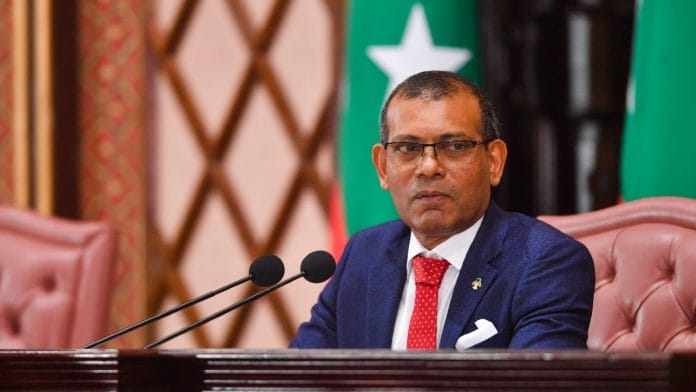New Delhi: With Sri Lanka witnessing an unprecedented political and economic crisis, Mohamed Nasheed — Speaker of the Maldivian Parliament (Majlis) and former president — has been in the news for allegedly negotiating Sri Lankan President Gotabaya Rajapaksa’s escape to Male Wednesday.
Sri Lanka declared a state of emergency Wednesday as fresh protests erupted in the wake of the president’s flight. The Speaker of Sri Lanka’s Parliament has announced that Rajapaksa would step down Wednesday as promised earlier, and that PM Ranil Wickremesinghe had been appointed acting president.
According to one report, the Maldives Civil Aviation Authority had turned down Rajapaksa’s initial requests to land a military aircraft in the Maldives; permission was later granted on Nasheed’s request, the report suggested.
Having spent long years in self-exile in Sri Lanka, Nasheed (55) — who co-founded the ruling Maldivian Democratic Party (MDP) — has enjoyed close relations with Sri Lankan political leaders, cutting across party lines.
Just two months ago, Sri Lanka’s then prime minister, Ranil Wickremesinghe, had granted Nasheed’s request to be appointed “coordinator” of Male’s relief efforts for Colombo.
His appointment stirred a debate in Sri Lanka about whether Nasheed was trying to facilitate a safe haven for the Rajapaksas — President Gotabaya, former prime minister Mahinda and other family members in government. Nasheed, however, had rubbished such claims.
“President Nasheed of the Maldives categorically denies biased reports of playing a role in the so called “exit strategy” of political leaders in Sri Lanka. His role for Sri Lanka is limited to seeking assistance for a country and people who have always been mutual friends especially in this difficult economic period,” his office had told Sri Lankan daily Newsfirst in May.
Also Read: The People vs the Rajapaksas in Sri Lanka and why it turned out this way
Nasheed’s ties to Sri Lanka
In his youth, Nasheed spent some time in Sri Lanka. He attended the Overseas School of Colombo in 1981 before moving to Dauntsey’s School in England from 1982 to 1984.
He rose to prominence in the Maldives in the late 1990s, when the country was ruled by autocratic strongman Maumoon Abdul Gayoom. A pro-democracy activist, Nasheed was arrested several times and sentenced to exile in remote areas by the Gayoom regime.
While in Sri Lanka during these brief moments of exile, he would actively interact with the press.
Kunda Dixit, Editor and Publisher of the Nepali Times, recalls meeting Nasheed at a KFC outlet in Colombo in 1993, where he told Dixit about the torture he had endured while in prison during the Gayoom regime.
Nasheed was ultimately elected to the Maldivian Parliament in 1999.
After riots in Male in September 2003, he left the Maldives for Sri Lanka, where he formed the Maldivian Democratic Party (MDP) to mount an opposition to Gayoom. While in exile, he shuttled between Sri Lanka and the UK, and returned to the Maldives after 18 months, in April 2005.
In 2008, Nasheed became the Maldives’ first democratically elected leader. However, in 2012, his government was toppled in a military-backed coup.
Nasheed was convicted on a terrorism charge and sentenced to 13 years in jail; the charges against him were dropped in 2015, but he was charged again a few months later in the same case by the Maldivian prosecutor general.
In 2016, he was allowed to travel to the UK for medical treatment after a brief stop-over in Sri Lanka. Shortly afterwards, he was granted political asylum in the UK.
In 2018, the Maldives Supreme Court nullified Nasheed’s conviction, terming it “questionable and politically motivated”. He returned to his country the following year, during which his former deputy, Ibrahim Mohamed Solih, emerged triumphant in the presidential polls. Nasheed was subsequently elected Speaker of Parliament.
(Edited by Amrtansh Arora)
Also Read: Charred coconut shell stoves, cycling — 5 hacks helping Sri Lankans survive economic crisis






